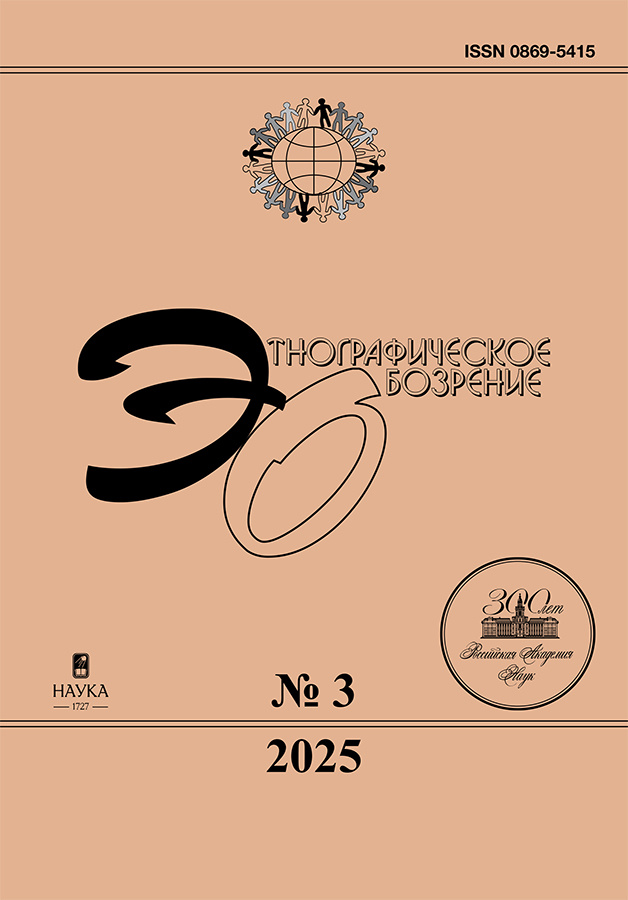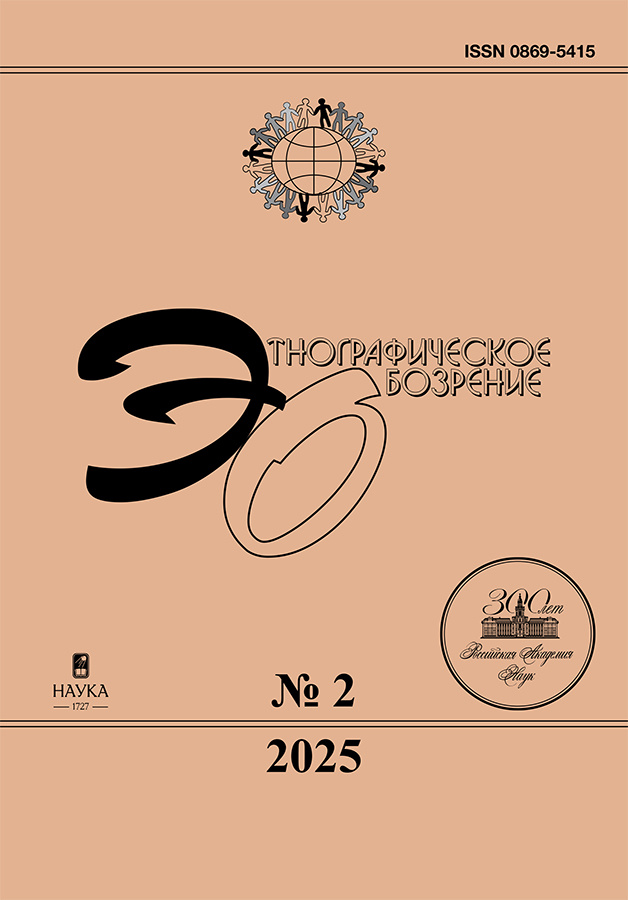A School Museum in Krasnogorsk, My Grandfather, and Me: Motivations and Mechanisms of Space Heritage Production
- Authors: Tanaylova V.1,2
-
Affiliations:
- Institute of Ethnology and Anthropology, Russian Academy of Sciences
- Moscow State Linguistic University
- Issue: No 2 (2025)
- Pages: 77–96
- Section: Special Theme of the Issue: Anthropology of Heritage: Critical Concepts in Russian Contexts (guest editor P.S. Kupriyanov)
- URL: https://rjonco.com/0869-5415/article/view/686645
- DOI: https://doi.org/10.31857/S0869541525020054
- EDN: https://elibrary.ru/TKRRLU
- ID: 686645
Cite item
Abstract
The article discusses a case where the processes of space heritage production by the Russian state and the production of family heritage by the author are intertwined. I examine the activities and motivations of four heritage actors: institutions directly implementing the state position in the field of space heritage, a school museum of space history in Krasnogorsk, my grandfather who worked for a long time as an engineer and referent for S.P. Korolev, and myself. The research optics is determined, on the one hand, by works dealing with the links and features of the interaction between heritage and politics; on the other hand, by works exploring the role of emotions and affects in the processes of heritage production. I employ the concept of authorised heritage discourse (AHD) to identify actors within the case, and the material analysed does not always fit within the conceptual framework. For example, one of the important elements of the AHD concept is the thesis of dominance of the expert community in the processes of heritage production and the hegemony of the expert knowledge they produce. My research, however, shows that drawing clear boundaries between experts and non-experts is not always possible, and actors’ inclusion or exclusion from the authorised discourse is not as unambiguous as it may seem at first glance. I pose several questions: how is the process of heritage production carried out by different actors? how are actors related to each other? what place do feelings and emotions occupy in the production of heritage by these actors and how are they related to the motivation for inclusion in this process? The research was drawn on interviews with museum workers, staff of the Krasnogorsk school № 18, and my own relatives, as well as archival materials including those belonging to my family, and autoethnographic work.
Full Text
About the authors
Valentina Tanaylova
Institute of Ethnology and Anthropology, Russian Academy of Sciences; Moscow State Linguistic University
Author for correspondence.
Email: v.tanaylova@iea.ras.ru
ORCID iD: 0000-0002-2872-8461
стажер-исследователь центра этнополитических исследований, младший научный сотрудник лаборатории социокультурной антропологии
Russian Federation, 32a Leninsky prospekt, Moscow, 119991; 38, build. 1, Ostozhenka St., Moscow, 119034References
- Blake, J. and L. Lixinski, eds. 2020. The UNESCO 2003 Intangible Heritage Convention: A Commentary. Oxford: Oxford University Press.
- Bozoğlu, G., G. Campbell, L. Smith, and C. Whitehead, eds. 2024. The Routledge International Handbook of Heritage and Politics. Abingdon: Taylor and Francis Group.
- Harrison, R., et al. eds. 2020. Heritage Futures: Comparative Approaches to Natural and Cultural Heritage Practices. London: UCL Press.
- Lasswell, G.D. 1936. Politics: Who Gets What, When, How. New York: McGraw-Hill Book Company.
- Kaeppler, A.L. 1996. Paradise Regained: The Role of Pacific Museums in Forging National Identity. In Museums and the Making of “Ourselves”: The Role of Objects in National Identity, edited by F.E.S. Kaplan, 19–44. Leicester: Leicester University Press.
- Karp, I., C.M. Kreamer, and S. Levine. 1992. Museums and Communities: The Politics of Public Culture. Washington: Smithsonian Institution Press.
- Khlevniuk, D.O. 2019. Pochuvstvovat’ prava cheloveka: affekt v muzeiakh pamiati [Feeling Human Rights: Affect in Museums of Memory]. In Politika affekta: muzei kak prostranstvo publichnoi istorii [The Politics of Affect: The Museum as a Space of Public History], edited by A.I. Zavadskii, V.M. Sklez, and E.V. Suverina, 106–122. Moscow: NLO.
- Kupriyanov, P.S. 2023. Drugie miry v muzee: eksponaty kak evokativnye obekty [Other Worlds in the Museum: Exhibits as Evocative Objects]. Etnograficheskoe obozrenie 6: 77–91.
- Malaya, E. 2023. Kapsula vremeni i progulki na Mars: ob instrumentakh kolonizatsii budushchego [Time Capsule and Walks to Mars: On the Tools of Colonisation of the Future]. Neprikosnovennyi zapas 4 (150): 14–35.
- Mason, R. 2024. We Need a New Way to Talk about Heritage and Politics. In The Routledge International Handbook of Heritage and Politics, edited by G. Bozoğlu, G. Campbell, L. Smith, and C. Whitehead, 48–57. Abingdon: Taylor and Francis Group.
- O’Kill, L. and B. Onciul. 2024. The Politics of Space Heritage: Colonising and Exploiting the Final Frontier. In The Routledge International Handbook of Heritage and Politics, edited by G. Bozoğlu, G. Campbell, L. Smith and C. Whitehead, 586–605. Abingdon: Taylor and Francis Group.
- Sivkov, D. and S. Gerovich. 2023. Pamyat’ o kosmicheskoi ere [Memories of the Space Age]. Neprikosnovennyi zapas 4 (150): 59–76.
- Sokolovskiy, S.V. 2000. Veshchnost’ i vlast’ v obydennom soznanii (avtoetnograficheskie etiudy) [Property and Power in Everyday Consciousness (Autoethnographic Studies)]. In Etnometodologiia: problemy, podkhody, kontseptsii [Ethnomethodology: Problems, Approaches, Concepts], edited by A.A. Piskoppel, V.R. Rokitianskii, and L.P. Shchedrovitskii, 7: 70–108. Moscow.
- Schopenhauer, A. 1864. Ueber die vierfache Wurzel des Satzes vom zureichenden Grunde [On the Fourfold Root of the Law of Sufficient Reason]. Leipzig: F.A. Brockhaus.
- Shnirelman, V.A. 2010. Istoriko-etnograficheskii muzei: prezentaciia tradicii ili reprezentaciia konstrukcii? [Introduction to a Discussion: Historical-Ethnographic Museum: Presenting a Tradition or Representing a Construct?]. Etnograficheskoe obozrenie 4: 3–8.
- Smith, L. 2006. Uses of Heritage. Abingdon: Routledge Taylor and Francis Group.
- Smith, L. 2021. Emotional Heritage: Visitor Engagement at Museums and Heritage Sites. Abingdon: Routledge; Taylor and Francis Group.
- Zoh, М. 2020. The Impacts of Dictatorship on Heritage Management. Wilmington: Vernon Press.
Supplementary files











